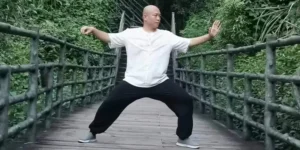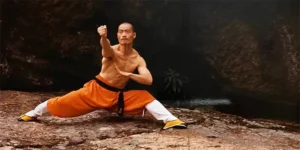Chinese martial arts is vast and mysterious. For the aspiring student, a question arises: “Is Tai Chi Kung Fu? Are they the same, completely different, or branches of the same tree?” The answer, like the arts themselves, is nuanced. Yes, Tai Chi is a style of Kung Fu (Gōngfu); it is a Chinese martial art with deep combat principles. However, its expression, training methodology, and philosophical theory differ significantly from what is commonly known as “kung fu.”
This leads to confusion: why do advanced practitioners often dedicate themselves to both? Should a novice choose Tai Chi or Kung Fu? Understanding these distinctions is not mere semantics; it’s crucial for aligning your training with your goals and unlocking the true potential of the arts. This exploration aims to clarify, compare, and guide you on your martial arts journey.

Tai Chi is an INTERNAL martial art (Nèijiā) emphasizing relaxed power, subtle body mechanics, sensitivity, and energy cultivation for health, self-defense, and spiritual development, while Kung Fu is a broader term encompassing hundreds of Chinese martial arts styles, many of which are EXTERNAL (Wàijiā), focusing on developing speed, strength, overt power, and dynamic techniques.
Tai Chi vs Kung Fu: Difference
Choosing the right path from the beginning prevents frustration and wasted effort. Mistaking Tai Chi only for gentle exercise ignores its martial depth, while approaching a hard Kung Fu style expecting immediate relaxation and meditative benefits leads to disappointment. Understanding the core philosophies allows you to select the art that aligns with your primary objectives: explosive self-defense, holistic health, meditative movement, competitive sport, or cultural immersion.
For many Westerners, “Kung Fu” conjures images of Bruce Lee’s lightning-fast strikes, acrobatic kicks from Jet Li, or the disciplined training montages in popular films. It’s often considered synonymous with “Chinese fighting.” “Tai Chi,” conversely, is frequently seen only as a slow-motion health exercise practiced in parks by seniors – a relaxing pastime divorced from martial application.
The terms “Kung Fu” (pronounced “kung-foo”) and “Tai Chi” (pronounced “tie-chee” or “tye-jee”) are used generically, sometimes interchangeably, reflecting a lack of understanding of the vast diversity within Chinese martial arts.

Kung Fu And Tai Chi Definitions
Kung Fu: This is NOT the name of a specific martial art. Gōngfu translates literally as “skill achieved through hard work and time” or “mastery.” It can refer to excellence in any discipline, such as cooking, calligraphy, or martial arts. In the martial context, it covers all Chinese martial arts systems. There are hundreds of distinct styles (e.g., Shaolin Kung Fu, Wing Chun, Hung Gar, Bajiquan, Praying Mantis), each with unique techniques, forms, strategies, and philosophies. These styles are categorized as either External or Internal, though many incorporate elements of both.
Tai Chi: This is a specific, highly sophisticated martial art system falling under the Internal category. Its full name, Tai Chi Quan, translates as “Supreme Ultimate Fist.” Its core principles are using softness to overcome hardness, yielding and adhering to an opponent’s force, maintaining central equilibrium, generating power from relaxed whole-body movement coordinated with breath and intention, and the cultivation and circulation of internal energy. While renowned for its profound health benefits, it is a complete and effective martial art.
Tai Chi vs Kung Fu: Similarities and Differences
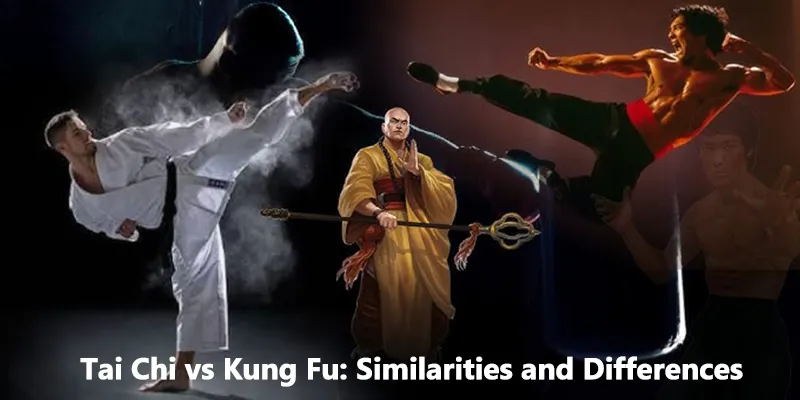
Similarities
Firstly, both Tai Chi and Kung Fu spring from Chinese history, philosophy, medicine, and culture. They are influences from Daoism, Buddhism, and Confucianism.
Secondly, their core was combat and self-defense. They use strikes, kicks, joint locks, throws, and leverage
Thirdly, both focus on the inseparable connection between mind, body, and energy. Discipline, focus, and perseverance are universal requirements.
Finally, both utilize prearranged sequences of movements to transmit techniques, principles, conditioning, and energy work.
Differences
Primary Focus: Tai Chi focuses on the use of internal power through relaxation, sensitivity, and precise body alignment. Most external Kung Fu styles initially emphasize developing external power through muscular strength, speed, and conditioning.
Training Methods: Tai Chi training typically begins slowly, focusing intensely on posture, relaxation, weight shifting, and internal awareness. Power is subtly from the inside out. External Kung Fu often has faster, more vigorous drills, strength training, and practicing techniques with overt power and speed from the outset.
Combat Strategy: Tai Chi focuses on yielding, neutralizing force, uprooting the opponent’s balance, and using their energy against them. It excels at close-range grappling and subtle strikes. Many external Kung Fu styles focus on blocking/parrying forcefully, overwhelming with speed and power combinations, and striking from various ranges with clear attacking and defending skills.
Health Benefits: While Kung Fu offers excellent physical conditioning, Tai Chi involves TCM principles, making its balance, flexibility, stress reduction, organ function, and Qì cultivation benefits central to its martial practice. Its low-impact property makes it suitable for all ages and fitness levels.
Energetic Qi: The conscious cultivation, circulation, and application of Qì is the primary training goal of Tai Chi. While Qì concepts exist in external Kung Fu, they often appear later or less central than the physical techniques.
Tai Chi vs Kung Fu: Which Is Better?
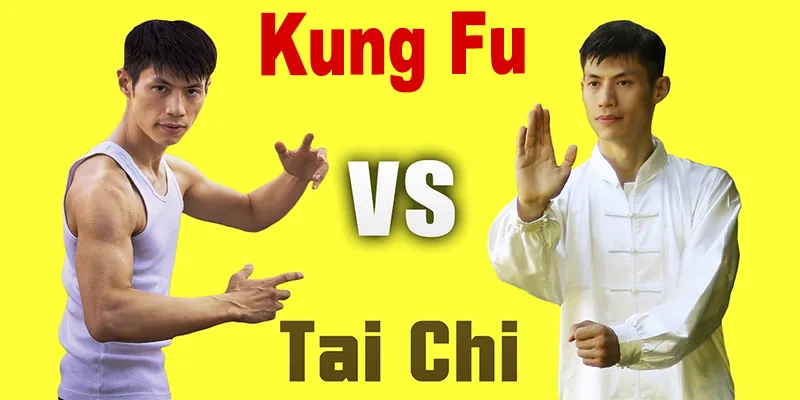
The question “Which is better, Tai Chi or Kung Fu?” is wrong. The answer is entirely dependent on yourself.
Choosing It for Fighting and Self-Defense:
Kung Fu often provides you faster access to practical, physically assertive self-defense skills. Styles like Sanda/Sanshou offer direct sport application. They are effective for enhancing your confidence in aggressive physical fighting. For immediate, physically dominant self-defense, Kung Fu wins. But, for close quarters and against larger opponents, Tai Chi is good.
Choosing It for Physical Fitness
Practicing Kung Fu often requires higher basic strength, speed, flexibility, and cardiovascular endurance, especially in rigorous external styles. It can be physically demanding. But Tai Chi is accessible to almost any fitness level. Builds core and leg strength, balance, flexibility, and joint health gradually and sustainably. It is excellent for disease recovery and maintaining fitness long-term.
Choosing It for Benefits:
Kung Fu can cultivate your discipline, confidence, self-defense skills, physical conditioning, cultural appreciation, and camaraderie.
Tai Chi has exceptional stress reduction, improved balance & coordination (crucial for fall prevention), enhanced focus, deep relaxation, profound TCM-based health benefits, meditative movement, and also discipline, confidence, self-defense skills, and cultural appreciation.
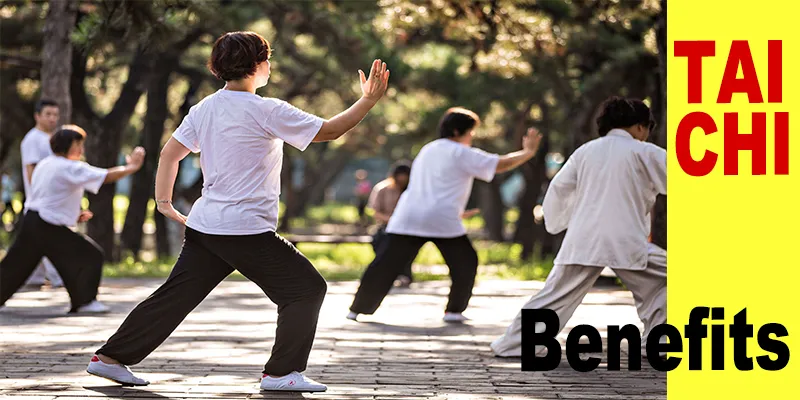
Learning Kung Fu and Tai Chi costs include tuition, uniforms, room and board, etc. The specific amount depends on the school, location, and instructor, not the martial arts and Kung Fu. The most important thing is that the quality of teaching is much more important than looking for “Tai Chi” or “Kung Fu.” It will be cheaper to find Kung Fu or Tai Chi classes near you, but they may not be as professional.
Therefore, look for experienced and certified coaches (such as Shen Jiangfei) who have a martial arts heritage, including Kung Fu and Tai Chi. A good martial arts school will provide professional Kung Fu and Tai Chi instruction to achieve your training goals.
Choosing Tai Chi or Kung Fu
Ask yourself these key questions:
Primary Goal
Q: Is it intense physical fitness and overt self-defense now?
A: Lean towards external kung fu.
Q: Is it holistic health, stress relief, balance, and internal cultivation, with martial depth as a long-term journey?
A: Lean towards Tai Chi.
Q: Is it cultural immersion or a competitive sport?
A: Searching for specific Kung Fu styles.
Physical Condition And Age
Q: Do you have injuries or limitations? Are you seeking gentle but effective exercise?
A: Tai Chi is often ideal.
Q: Are you young, highly athletic, and seeking vigorous training?
A: Many Kung Fu styles fit well.
Personal Hobbies
Q: Are you drawn to dynamic, explosive movement?
A: External Kung Fu.
Q: Are you drawn to calm, deliberate, flowing movement focusing on internal sensation?
A: Choose Tai Chi.
Your Time And Patience
Q: Are you prepared for a potentially longer, more subtle journey to martial effectiveness?
A: Tai Chi.
Q: Do you want more immediately tangible physical results?
A: Kung Fu.
Try both! Most reputable schools offer introductory classes. Experience the energy of a Kung Fu class and the flow of a Tai Chi camp class firsthand.
Master Both at Shen Jiangfei Martial Arts School
At Shen Jiangfei International Martial Arts School, we are breaking down “Tai Chi or Kung Fu.” We fully play the profound depth and unique strengths of both paths, offering authentic martial arts instruction.

Sheng Jiangfei is not merely a teacher; he is a master with decades of dedicated practice and verifiable lineages in both authentic Chen Tai Chi style and Shao Lin Kung Fu. His deep understanding ensures you learn the true martial art, not just fake movements.
Beyond the graceful tai chi forms, you will systematically learn the internal mechanics and Qì cultivation through rigorous push hands training and form breakdowns. Understand the “why” behind every movement.
Our Kung Fu curriculum focuses on practical effectiveness, building genuine strength, speed, technique, and fighting spirit. Shen emphasizes proper body mechanics, conditioning, and the philosophical discipline inherent in true Gōngfu.
Our tiered programs offer exceptional value, ensuring you receive top-tier coaching without prohibitive costs. From your first inquiry, you’ll experience our commitment to your journey. Welcoming, supportive classes foster growth and camaraderie in a respectful environment.
Whether you choose the deep internal waters of Tai Chi or the dynamic fire of Kung Fu, our courses provide clear, step-by-step progression. You build a solid foundation, understand principles, and advance steadily towards mastery.
In conclusion, whether you want to learn Kung Fu or Tai Chi, Shen Jiangfei International Martial Arts School is one of your choices!

